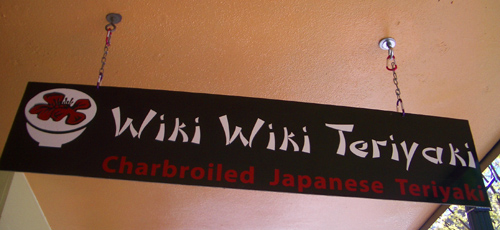 |
| The most exciting photo of a wiki I could find... |
Lurking around the web, checking out various wikis for this assignment, I came across two very distinctly different versions of what was called a "wiki".
The first thought that springs to mind for me is the old faithful "Wikipedia - the free encyclopedia", which, love it or hate it, is plain brilliant for finding information about what you need. For a trivia buff like me, I am constantly fascinated by just how much information is actually available there. How reliable that information is, depends entirely on the person who shares the information, but what a great way to get research or a conversation started. This is the penultimate example of a working wiki - an open, collaborative tool for sharing information, that anyone can edit or add to. This has had the effect of creating a resource that is many million times bigger, more relevant and broader than the tomes that those poor Encyclopedia Brittanica salesmen used to lug from door to door - some 4,505,641 articles when I was there today. Some forward thinking and innovative libraries even have "Wikipedia Librarian" positions these days.
The other type of wiki that I came across are really shared websites under the guise of a wiki, where we are given permission to observe other learned (or not so learned) people collaborate on projects, or share their knowledge, without the same facilities to add our own comments or knowledge to the conversation. A closed wiki, I guess.
I have used a wiki myself to enable collaboration on projects and they are very useful for that purpose. To a certain extent, applications such as Google Drive, are a form a wiki and they allow me to work with others on projects as if we are in the same room, sharing ideas and creating documents in real time. Previous generations could never have believed how easy it would be to collaborate with someone so closely and never need to see them in person.
As a really visual person, I find wikis quite dull to look at and long for the day when they create new and beautiful interfaces to go with the information they provide. Even a Google image search for wiki gave me a series of the most uninspiring images imaginable, hence the image I have chosen to use for this post.
The visuals aside, the power of the wiki like Wikipedia, in my opinion, is in the way they allow us all to share our own knowledge to create huge databases of searchable resources. This is collaboration at its best. Lay person and expert providing the most relevant information, sharing with us all their knowledge and research, creating a rich, multilayered and fathomless resource.
National Library of Australia Wiki:
Wiki.nla.gov.au, (2014). Dashboard - National Library of Australia wiki. [online] Available at: https://wiki.nla.gov.au/dashboard.action [Accessed 11 Jun. 2014].The National Library of Australia (NLA) Wiki is a tool used by the Library to allow collaboration, feedback and information sharing about NLA projects and working groups.
This wiki contains such wonderful spaces as updates to the Libraries Australia Document Delivery Manual, Library Labs - an online discussion of the NLA discovery searches, and the People Australia Project.
Using a very simple interface, the home page of this wiki, contains a comprehensive list of links to recent updates to the wiki. This is not an open wiki, specifically for open discussion within work or project teams, however, it is a good example of how a wiki can be used in this way. It is generous that this information is available for non members to view and learn from.
The NLA is very authoritative source and this wiki is very up to date and relevant. Whilst I did not find citations, often links are included to enable you to click on to further information about the project or subject.









I love the photo too. Good find
ReplyDelete